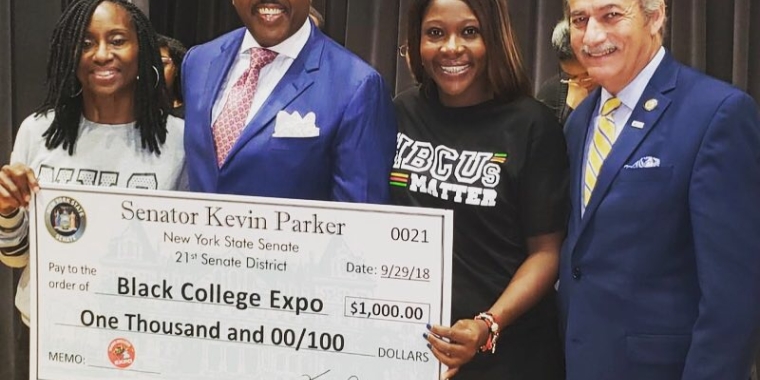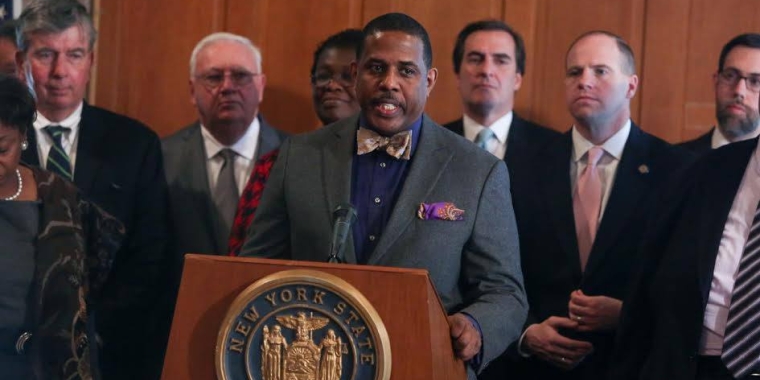
Parker Proposes Alternative Sources of Funding to Close Budget Gap to Protect Children and the Disabled
Kevin S. Parker
March 24, 2011
For Immediate Release: Wednesday, March 23, 2011
Parker Proposes Alternative Sources of Funding to Close Budget Gap
to Protect Children and the Disabled
(Albany, NY) Senator Parker submits memo to Democratic Conference offering alternative sources of funding to account for $2.5 billion in cuts to education and social services.
The Governor’s 2011-2012 Executive Budget is void of meaningful revenue generating provisions, placing the emphasis on cuts. Last week the Senate Republicans passed a budget resolution with numbers that do not add up. Unfortunately, neither adequately serves the needs of New Yorkers and places the burden of ‘shared sacrifice’ on our children and the most vulnerable in state. “We cannot rob our children of their future with $1.5 billion in cuts to education. Nor can we deny the elderly, victims of crime and the homeless with $1 billion in cuts to social services,” said Parker.
“In light of New York’s fiscal situation, the state must evaluate other options. Now is not the time for tax cuts to millionaires, they should pay their fair share,” continued Parker. In addition, Senator Parker proposes 5 revenue measures that close the budget deficit by nearly $2.5 billion to fully fund education and social services. Below are his proposals for sources of revenue along with an explanation.
1. Stock Transfer Tax $ 1.5 billion
2. Wine in Grocery Stores $ 300 million
3. Net Operating Loss Deduction Cap $ 250 million
4. Cigarette Tax $ 150 million
5. Alcoholic Beverages Tax $ 80 million
TOTAL $ 2.28 billion
Stock Transfer Tax
If the entire stock transfer tax was not rebated, the state would have received $16 billion last year. My proposal would reduce this rebate from 100% to 90%. This fraction of a penny tax would have yielded $1.6 billion in 2010. The current law in New York taxes the sale of stock on a sliding scale based upon the price at which the share is sold. Shares under $5.00 are charged $0.0125. Whereas the tax increases up to $.05 for shares sold at more than $20.00, with the amounts in between at varying rates. My estimate of $1.5 billion is based on a three average $15 billion.
Furthermore, as a matter of policy, Nobel prize winning economists including James Tobin, Joseph Stiglitz and Paul Krugman contend that such a tax would create more stability by reducing the amount of speculation in the markets. Indeed, this fractional increase is a nominal cost for those engaged in long-term investment.
Contrary to assertions made by some that this would lead to stock exchanges moving, there is no proof of such. In fact in recent years major efforts have been made in England to eliminate the 0.5% stamp tax on each trade on the London Stock Exchange. However, their political leadership has not bowed in a race to the bottom. In 2009, the British Treasury received over $4 billion in revenues. More importantly despite the tax, neither capital nor jobs have fled London.
Wine in Grocery Stores
At this time, wine can only be sold through New York’s 2,400 liquor stores. By expanding sales to the state’s 19,000 grocery stores, the state is expected to receive between $300 and $500 million in revenues depending on store participation. In addition, I support provisions that permit liquor store owners to expand their product line and strengthen their ability to negotiate with distributors.
Corporate Net Operating Loss Deduction Cap
Currently businesses are permitted to file amended income tax returns for past years in which they were profitable, by using the current year’s business losses to offset those profits, and receive refunds for taxes paid in past years. During economic downturns when business tax revenues slump, refunding business taxes paid in prior years can exacerbate state budget deficits. According to the Center on Budget and Policy, in recent years California, Colorado, Kentucky, Illinois, and North Dakota have adjusted, repealed or suspended their corporate net operating loss (NOL) deductions.
Currently, New York’s NOL deduction is linked to the federal rate. This does not have a bearing on personal income tax or businesses that are sole proprietorships and partnerships. Rather than suspending the NOL wholesale, I propose that we cap the deduction to $1 million. By adopting this cap, the deficit could be reduced by a minimum $250 million.
Cigarette Tax
Last year, we increased taxes on cigarettes to $4 per pack. This has benefited the state by increasing revenues by $440 million and decreasing consumption. I propose that we increase the rate to $6.00 per pack. The expected receipts of this increase will be $150 million, not accounting for the immeasurable societal health benefits. I have introduced S. 2981 to accomplish this goal.
Alcohol Tax
Currently, New York’s tax on wine is the second lowest in the nation at 19 cents per gallon. Neighboring states have significantly higher rates, Connecticut taxes at 60 cents per gallon and New Jersey at 70 cents. Raising the wine tax in New York to 51 cents per gallon and the beer tax from 11 to 24 cents per gallon would yield the state an estimated $65 million annually. Additionally, mandating parity in taxes for malt-based soda-like alcoholic beverages also known as “alcopops” with beer would raise another $18 million.
About Senator Kevin Parker
Senator Kevin S. Parker is committed to restoring the overall quality of life for the constituents of the 21st Senatorial District in Brooklyn. A lifelong Brooklyn resident, Senator Parker has been a Flatbush resident for more than 30 years. Having been nurtured, schooled and employed in the district, Senator Parker is intimately familiar with the needs of ethnically diverse community that consists of 311,000 constituents in several communities which include: Flatbush, East Flatbush, Midwood, Ditmas Park, Kensington and Borough Park.
Share this Article or Press Release
Newsroom
Go to NewsroomSenator Parker Hosts “Black College Expo – New York” in Brooklyn
October 1, 2018


Senator Parker Celebrates Back-To- School
August 26, 2018

